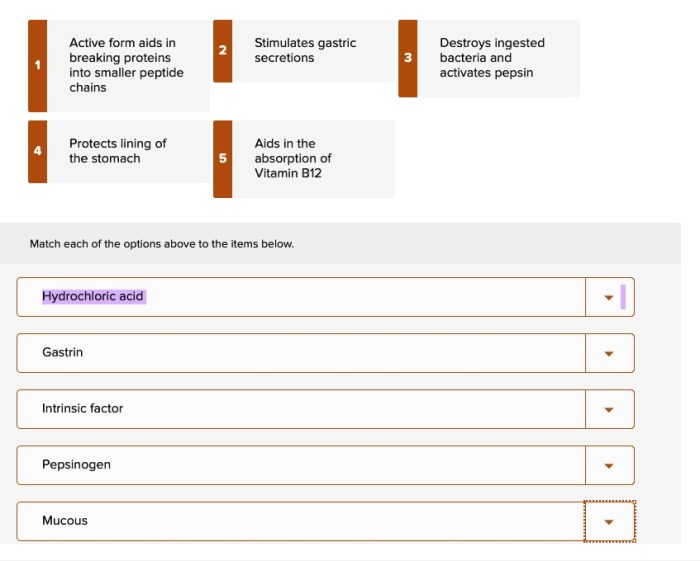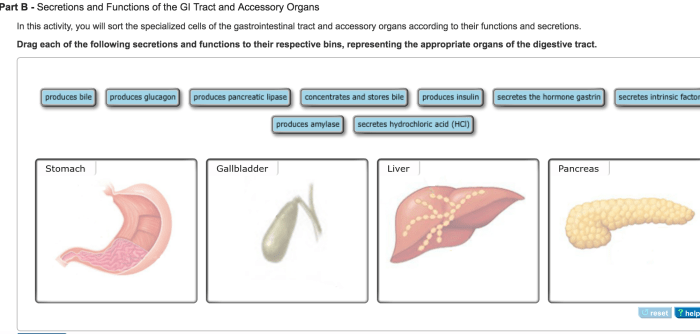Match the following gastric secretions with their appropriate function to gain a comprehensive understanding of the vital role they play in digestion. Gastric secretions, produced by the stomach, are essential for breaking down food and ensuring proper nutrient absorption. This article delves into the specific functions of hydrochloric acid, pepsin, mucus, and intrinsic factor, highlighting their significance in the digestive process.
Understanding the interplay between gastric secretions and their functions is crucial for maintaining a healthy digestive system. Impaired gastric secretion can lead to digestive disorders and nutrient deficiencies. By exploring the intricate mechanisms of gastric secretions, we can appreciate their importance and take steps to support optimal digestive health.
Gastric Secretions

Gastric secretions are fluids produced by the stomach that play a crucial role in digestion. They aid in the breakdown of food, protection of the stomach lining, and absorption of nutrients.
The importance of gastric secretions cannot be overstated. They create an acidic environment in the stomach, which is necessary for the activation of pepsin, an enzyme that breaks down proteins. Additionally, gastric secretions protect the stomach lining from the corrosive effects of hydrochloric acid and facilitate the absorption of certain nutrients, such as iron and vitamin B12.
Functions of Gastric Secretions
Gastric secretions perform a variety of functions essential for digestion:
- Breakdown of food:Hydrochloric acid creates an acidic environment that activates pepsin, an enzyme that breaks down proteins into smaller peptides.
- Protection of the stomach lining:Mucus forms a protective layer over the stomach lining, shielding it from the corrosive effects of hydrochloric acid.
- Absorption of nutrients:Intrinsic factor, a glycoprotein secreted by the stomach, binds to vitamin B12 and facilitates its absorption in the small intestine.
Matching Gastric Secretions with Functions, Match the following gastric secretions with their appropriate function
| Gastric Secretion | Function | Description | Example |
|---|---|---|---|
| Hydrochloric acid | Activates pepsin, kills bacteria | Strong acid, pH 1-2 | – |
| Pepsin | Breaks down proteins | Proteolytic enzyme | – |
| Mucus | Protects stomach lining | Thick, viscous fluid | – |
| Intrinsic factor | Facilitates vitamin B12 absorption | Glycoprotein | – |
Additional Considerations
Several factors can affect gastric secretion, including:
- Hormones:Gastrin and histamine stimulate gastric secretion, while somatostatin inhibits it.
- Neural signals:The vagus nerve stimulates gastric secretion, while sympathetic nerves inhibit it.
- Diet:A high-protein diet stimulates gastric secretion, while a high-fat diet inhibits it.
Impaired gastric secretion can lead to a variety of digestive problems, including indigestion, bloating, and malabsorption. Therefore, maintaining optimal gastric secretion is essential for proper digestion and overall health.
Common Queries: Match The Following Gastric Secretions With Their Appropriate Function
What is the primary function of hydrochloric acid in the stomach?
Hydrochloric acid creates an acidic environment in the stomach, which kills bacteria and activates pepsin, an enzyme that breaks down proteins.
How does pepsin contribute to digestion?
Pepsin is a protease that breaks down proteins into smaller peptides, facilitating their absorption in the small intestine.
What is the role of mucus in the stomach?
Mucus forms a protective layer that shields the stomach lining from the acidic environment and enzymes.
Why is intrinsic factor important for digestion?
Intrinsic factor binds to vitamin B12 and facilitates its absorption in the small intestine, which is essential for red blood cell production and neurological function.

